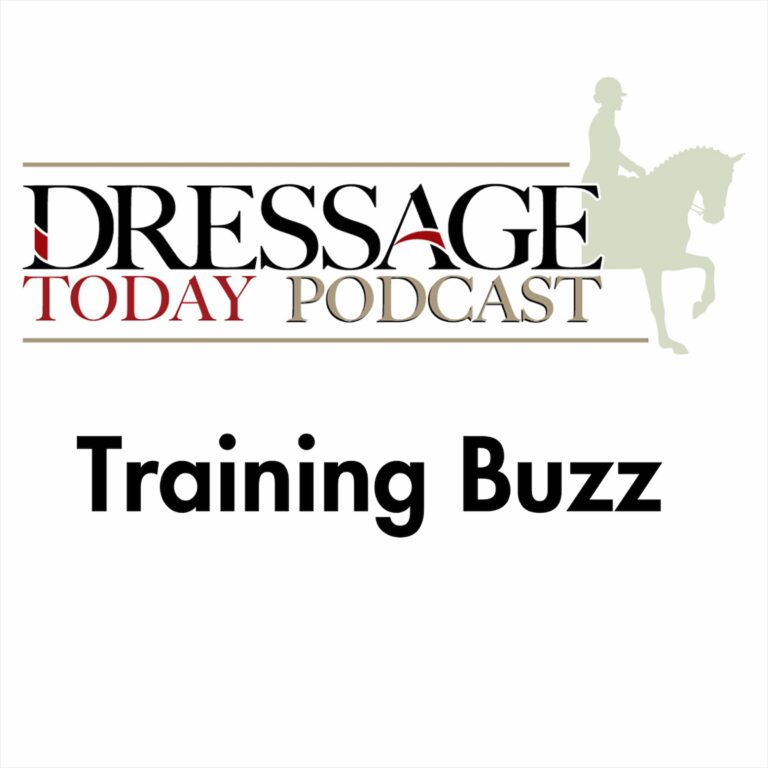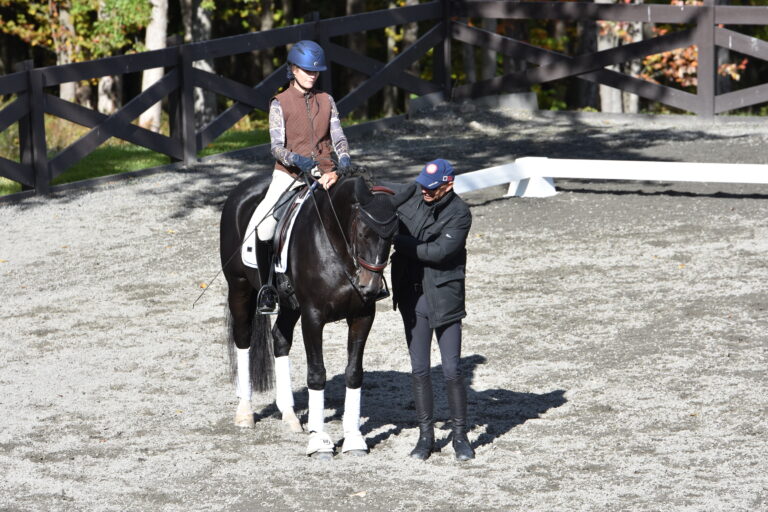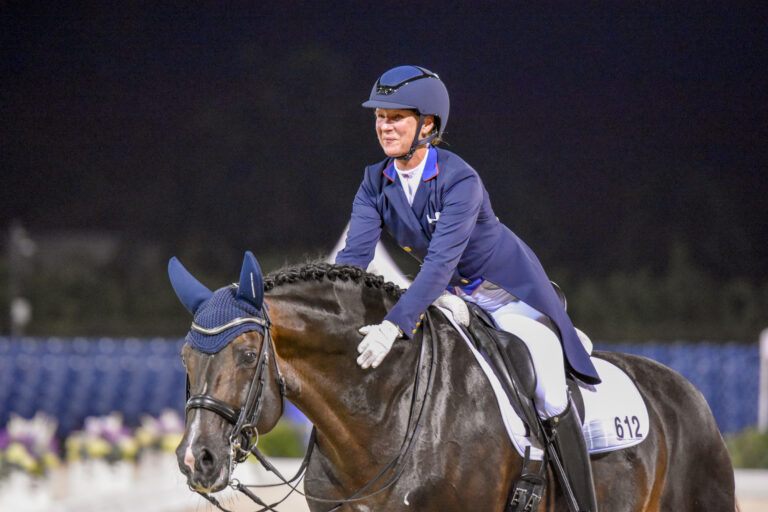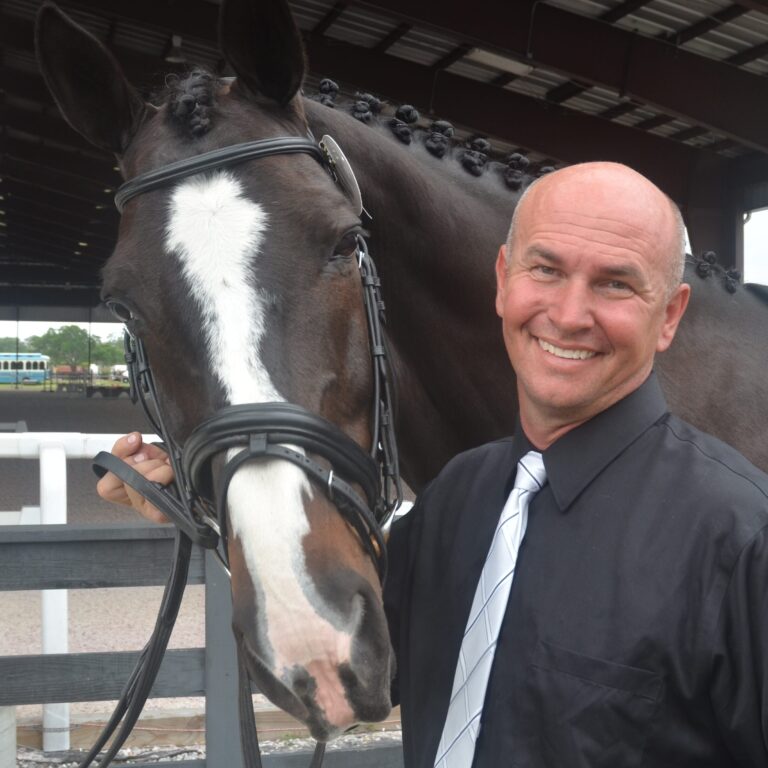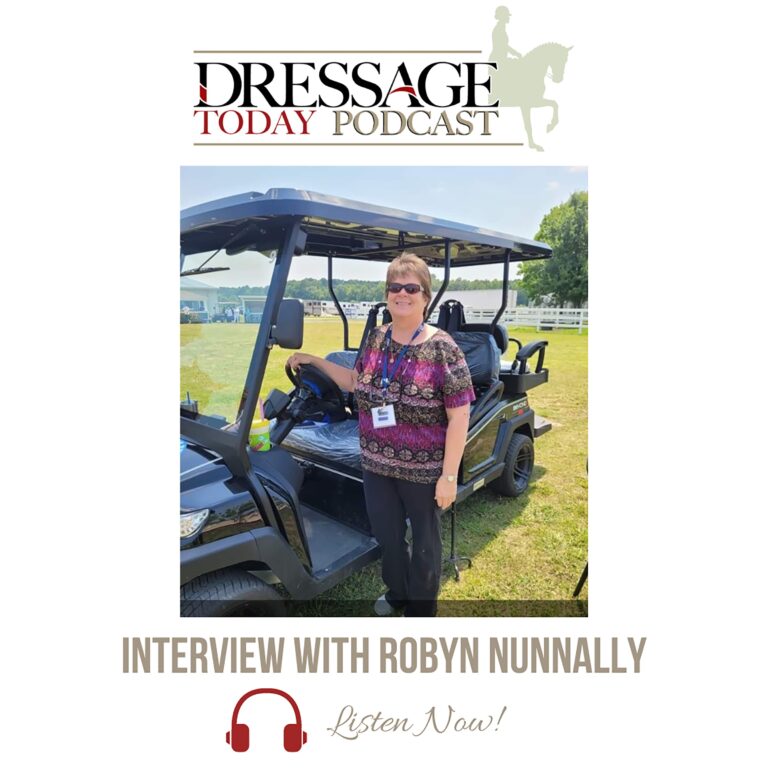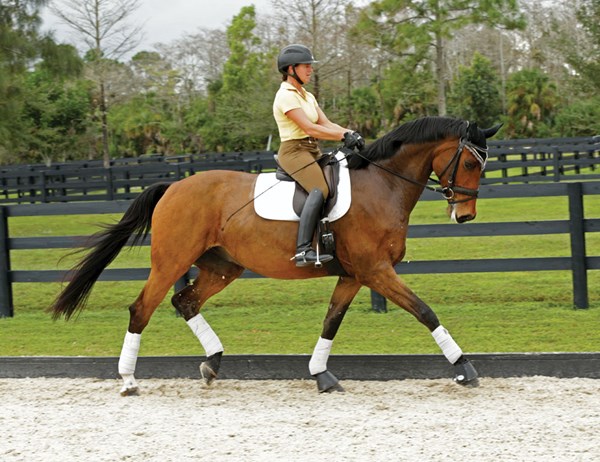It was mid-July when we met at the Newark, New Jersey, airport—four Young Riders, ready for the trip of a lifetime. A flight to Dusseldorf, Germany, and then a train ride to Aachen brought us to what is known as the best dressage show in the world—CHIO Aachen. We were the 2018 participants in The Dressage Foundation’s (TDF) Young Rider International Dream Program, which is sponsored and administered by TDF and was founded by Olympian Michael Poulin, who is on its board of directors. The concept of the program is to allow dedicated U.S. Young Riders the opportunity to enhance their understanding of dressage theory and culture in Europe.
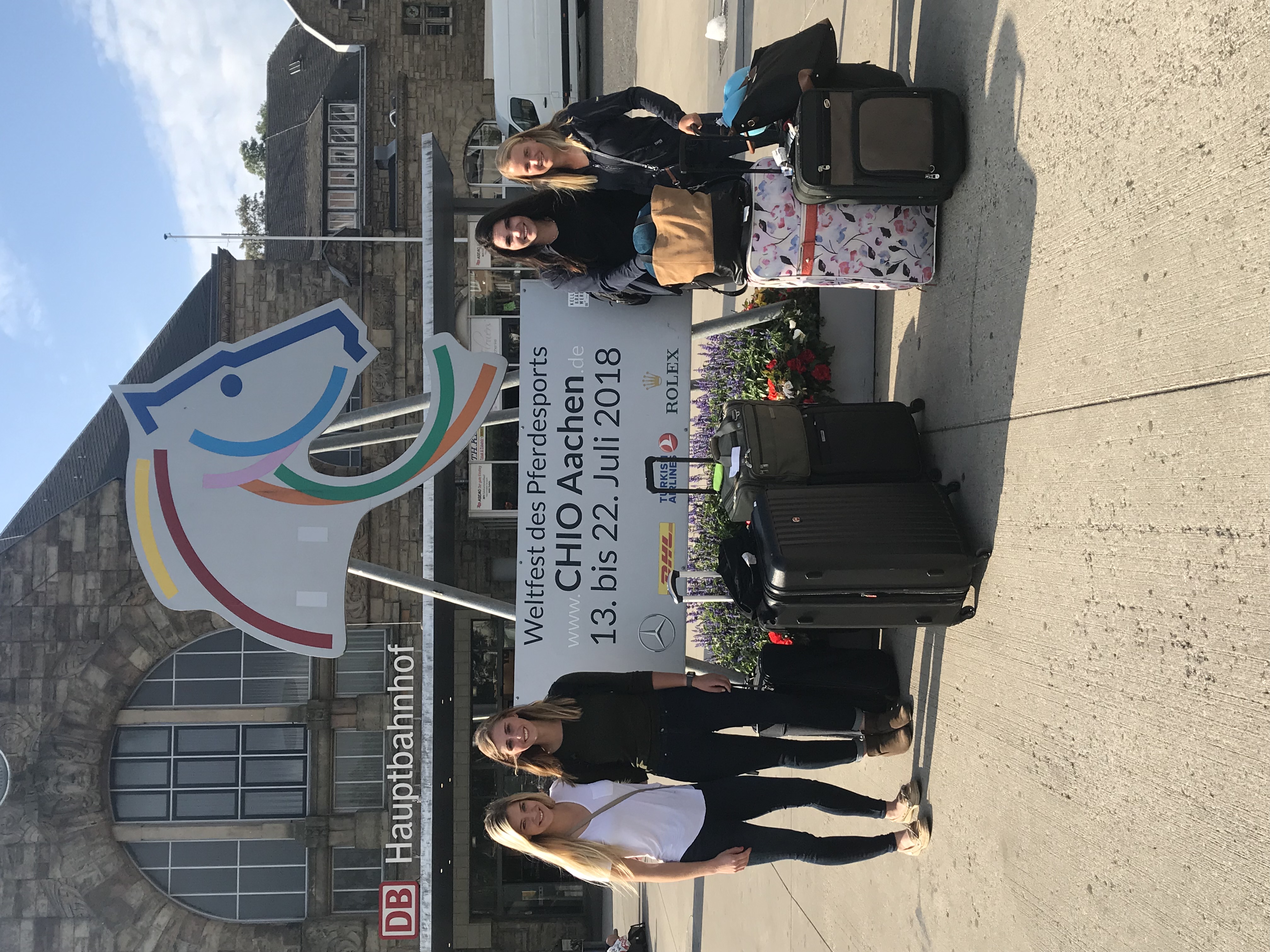
We observed, discussed and absorbed the European training system, which will be beneficial for the rest of our careers. Our primary chaperone, Barcelona (1992) Olympian Charlotte Bredahl, is a current U.S. dressage youth coach, and our second chaperone, Meaghan Byrne, is a professional rider and a teaching faculty member in the business department at Averett University. Both had previous European experiences and Charlotte’s connections proved priceless as we met many of the world’s best riders and trainers, who generously donated their time to speak with us (see sidebar on p. 44).
Aachen was unlike any horse show we had ever experienced. The show started in 1924 and is rooted in the culture and community of the city, often attracting over 150,000 spectators. In addition to dressage, the show includes world-class eventing, show jumping, vaulting and combined driving.
We are excited to share six key attributes that we learned go into developing a top horse-and-rider combination: awareness, attitude, camaraderie, honesty, education and nurture.
Awareness
This is the greatest ingredient for change and self-improvement. When talking to team riders, we became acutely aware of the extensive amount of time they spend taking care of their horses every day. Most of the riders do all the horse care themselves. They know these horses from nose to tail, which allows them to notice slight changes in their horses’ condition. Taking care of these world-class mounts is a full-time job and being aware of the details that keep them sound and happy is crucial for success. In addition, the riders pay no less attention to their own physical fitness and their mental well-being so they can be the best rider possible for their horse and the team. It was inspiring to hear that team members and coaches went to the gym together daily to improve their physical fitness. Being aware of and able to address weaknesses in your horse or yourself is vital for continuous improvement.
We also heard from U.S. team coach Debbie McDonald that making the Olympic team should never be your only goal. Enjoy the process and take pride in your journey toward success and excellence, she said. Making a team is dependent on years of hard work, but luck and timing are also considerable factors. The stars have to align at the right time, with the right horse and the right people behind you for it all to work out. Olympian Laura Graves talked about her journey as a constant investment in furthering her education and enjoying the process. And as Steffen Peters described, even for Olympians as well-seasoned as he is, the learning is endless. Never stop stepping outside of your comfort zone when pursuing greatness. Growth happens when you are challenged. Staying humble and keeping an open mind while being aware of who you are and what you value will be your greatest asset. No matter how far you go, always remember the people who helped you along the way and give them the credit they deserve.
While in Aachen, we had the opportunity to meet a few international judges, including Henk van Bergen, who was a member of the FEI Judges Advisory Panel. We have a newfound respect for the art of judging dressage and the years of education and continued dedication it demands. It may easily go unrecognized that the judges of these major competitions are under pressure and scrutiny from every angle. The main objective of judging is to guide a rider in the right direction in her training. So these judges are all working to provide riders with the most correct and helpful advice. We learned to always remember that judges want to see riders succeed and they will give out high scores when deserved.
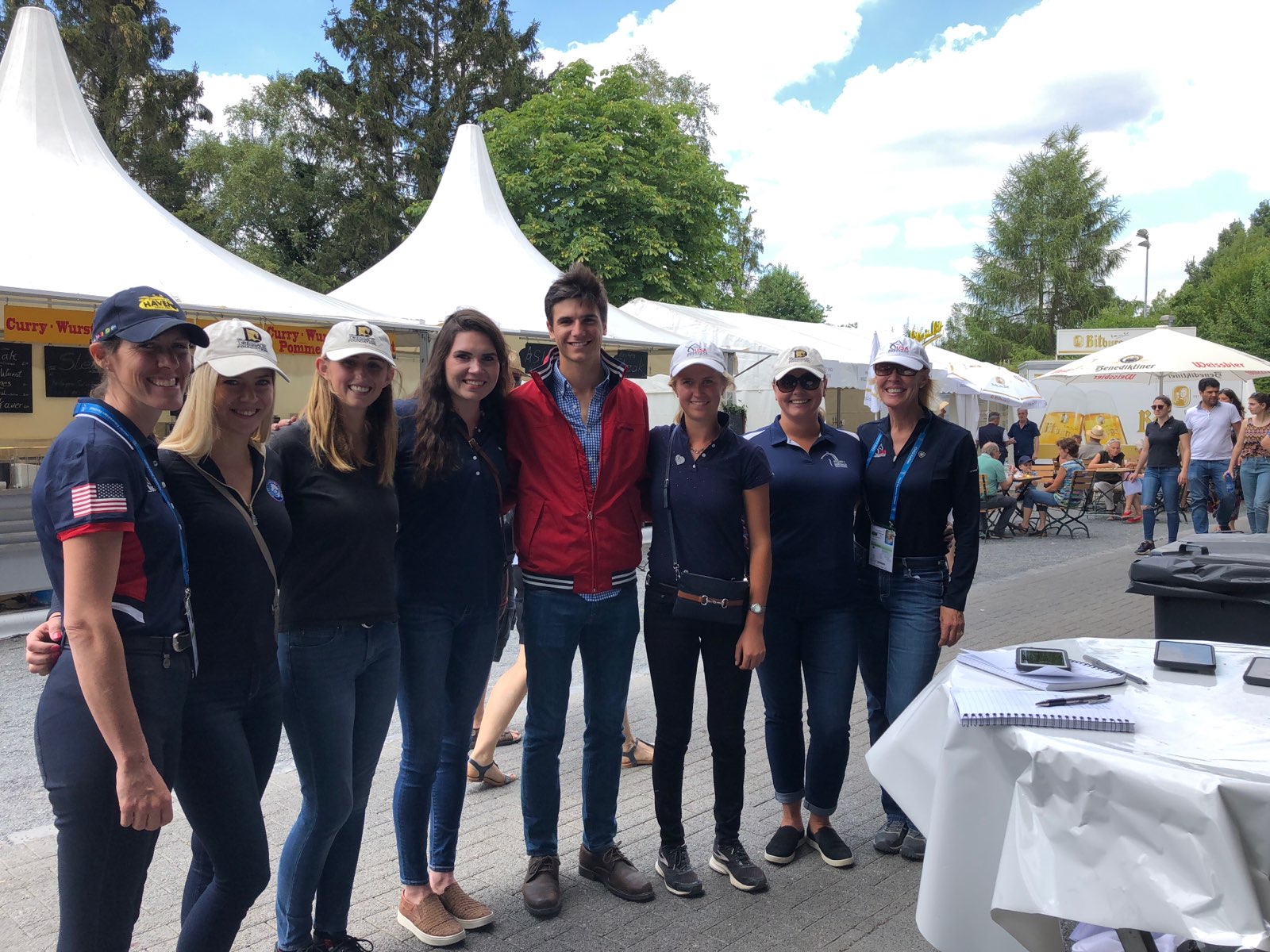
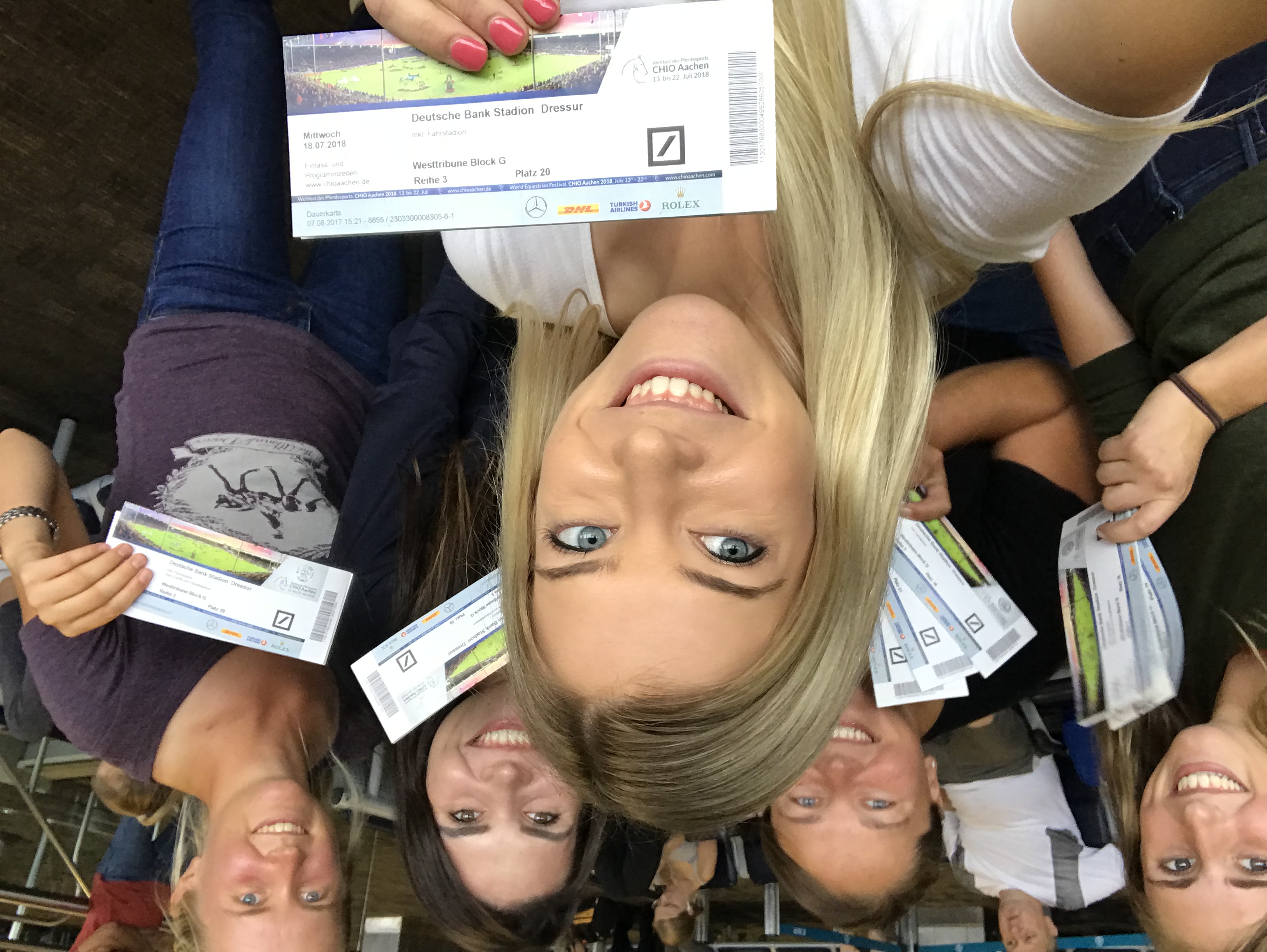
Attitude
This is a determining factor in your present and future success. We had the privilege of witnessing great examples of sportsmanship at Aachen. When riders had a bad test, they patted the horse and left the ring smiling and waving to the audience. Demonstrating composure and good horsemanship, even in an emotional or disappointing situation, will allow your quality of character to shine. Everyone involved with horses understands that this can be, at times, a frustrating and difficult sport. We all go through tough times, bad rides or unfortunate circumstances. Patience and persistence are your greatest allies. It is essential to always return to every moment and every ride with a clean mental slate. Do not allow yourself to latch on to the negativity of yesterday or the mistake in the last movement, as this will only hinder your next step. It’s best to keep moving forward with the attitude that tomorrow is another day.
Several professionals stressed that a rider’s reputation is being made all the time. Dressage is a small and well-connected community. Potential sponsors pay attention to how you behave even when you don’t think they’re watching and they take note of how you handle the most difficult and stressful situations. Betsy Juliano, the owner of Olympian Adrienne Lyle’s mount, Salvino, told us she especially admired Adrienne because of how gracefully she had seen her handle a number of challenges. She said her class and resilience were influential factors in her decision to support her in the future.
We asked multiple competitors how they stay mentally strong and focused when under pressure. Laura stressed that it is incredibly important to surround yourself with the right people. A positive, honest, understanding support group will motivate you to do your best while commiserating with you and understanding the challenges that come along the way.
As far as mental preparation, the riders we spoke with had different tools that worked best for them. Some used techniques such as visualization, while others sought help from a sport psychologist. There is not one method that works for everyone. A few additional suggestions from some of the American team riders included finding an outlet to keep your mind focused and busy, taking quiet time for yourself and having someone you trust to share your frustrations with.
Steffen explained that nervousness often comes from feeling unprepared. As a rider, you always come to a horse show with a puzzle. It becomes a real problem when there is a missing piece. Always be sure you are competing at a level where you and you horse feel fully confident. Never allow the atmosphere of a horse show or your own mental anxiety to alter the way you ride—learn to separate your worries from your horse’s needs. Steffen described how he always strives to keep the standard of performance at the same level when working at home as at the show so his horses feel prepared and are not surprised by a sudden increase of pressure when on new territory.
Camaraderie
Be supportive of others and build a support group of people who understand. On our first day together, we all bonded right away. It was such a privilege to meet other people with similar goals and lifestyles. When we arrived in Dusseldorf, we had an hour-long train ride to Aachen. We got the chance to hear about each other’s day-to-day life and realized just how much we had in common. All of us hold some form of full-time job at the barn, which we balance with college, and we are all pursuing a career in the horse industry as trainers. In our sport, it is sometimes difficult to find time for social events and time with friends outside of the endless hours spent at the barn. It was great to meet others who go through similar challenges and have an understanding of the dedication it takes.
Many of those we spoke to during the week clearly emphasized the importance of an understanding support group. The individual nature of dressage sometimes makes one feel as if she is in it alone. There is endless value in having someone to turn to who understands your sport beyond a surface level and can empathize with the challenges. Talking to someone who has been in your shoes and has gone through similar experiences can be very uplifting when you are struggling. It was clear when speaking with Laura and fellow Olympian Kasey Perry-Glass that the two were great friends, whose bond had only been made stronger throughout their time as teammates. Laura mentioned that sometimes confiding in someone outside the horse industry about the struggles you may be facing in your riding does not always have the same effect as talking with someone who may have faced that same challenge herself. Other riders can empathize because they understand just how important your horse and your riding are to you.
Evidence of a strong and close-knit support group was clearly seen in the U.S. contingency competing in Aachen. The camaraderie among team members was palpable. They were always there to cheer each other on and did just about everything together, from going to the gym to doing each other’s hair. Throughout this show, all the riders were still competing for spots on the WEG team, but this didn’t stop any of them from supporting each other without reservation.
An additional benefit of an understanding support group is the opportunity to talk things through and learn from those around you. Talk to others around you about your riding and what you are seeing. Being able to discuss the rides we saw throughout the week with each other left us all with a much better sense of what we were seeing and how we could apply it to our own riding. Charlotte took time while we were watching tests to sit with each of us individually and discuss what we saw. It was so helpful to be able to learn from her perspective as both an Olympian and FEI judge and compare it with our own. Learning to verbalize your thoughts helps bring clarity and understanding to what you are taking in.
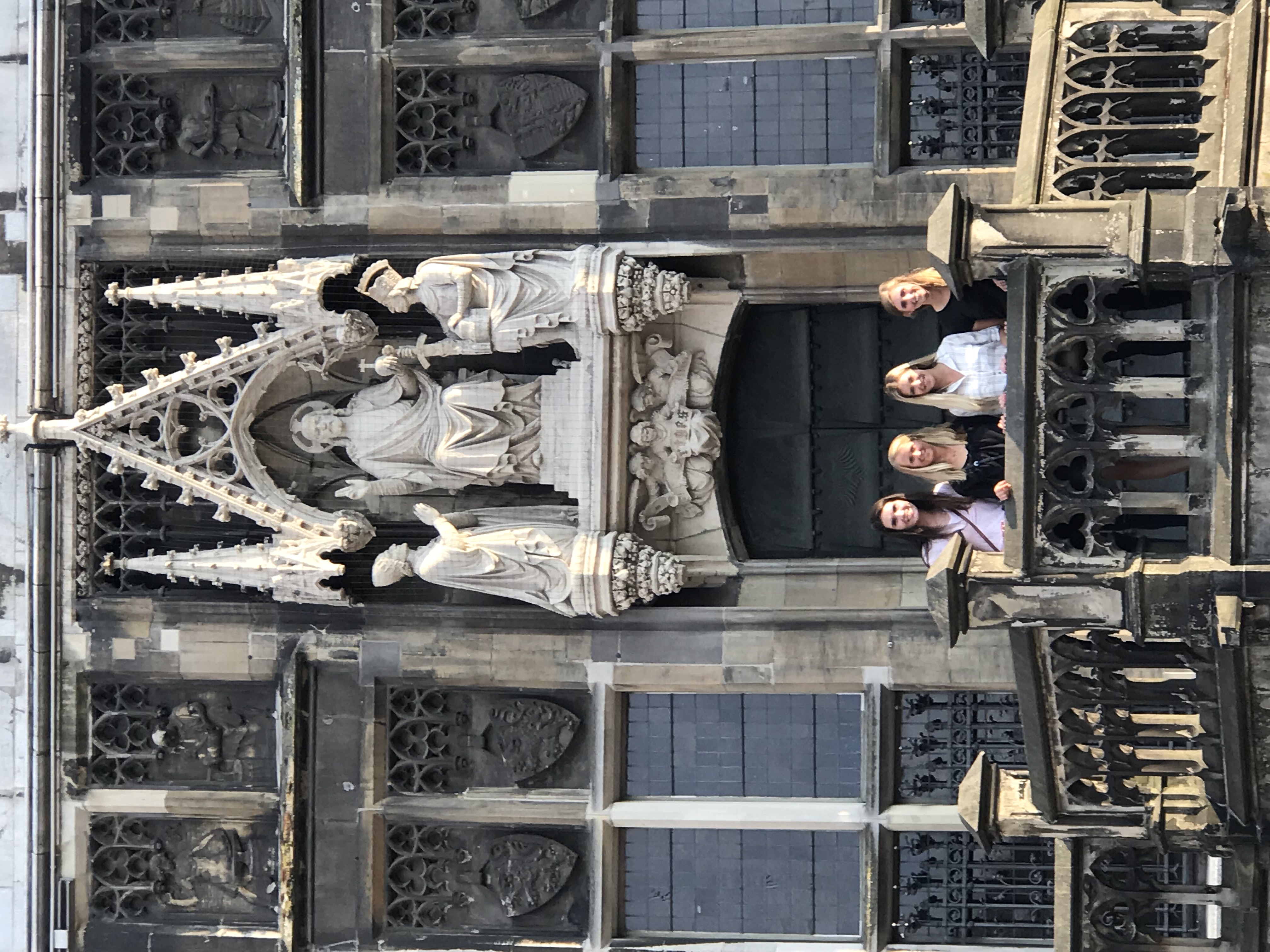
Honesty
This is vital for quality communication and success. One of the most impactful traits that all the people we spoke to demonstrated was honesty. Everyone gave genuine personal responses to the questions we asked, clearly showing us that even riders who are incredibly successful and competing at a high level still have the same challenges and feelings as we do. They all talked about how they deal with nerves at competitions and how they deal with the stress of representing their country and having their teammates rely on them. Many riders commented that everyone handles pressure differently, so you need to find the system that works best for you.
They all emphasized the importance of communication in every aspect, from keeping sponsors informed to talking with your trainer, vet, farrier and so on. Adrienne described how communicating honestly shows people you are invested in the well-being of your horse and interested in keeping people involved. If you don’t have communication between the many members of your team, you are missing an opportunity to brainstorm the best possible plan for your horse.
An excellent example of class and honesty was when one of the German team riders, Dorothee Schneider, scratched her horse from the CDI 4* because the horse had a swollen leg that morning. The rider came out to the arena during her ride time and announced to the crowd what had happened and explained the situation. This candid act avoided unnecessary speculation and gossip that may have otherwise taken place had the rider not made that decision. Being honest in this sport will make for a more positive and supportive dressage community.
Education
Never stop learning, communicating and making an effort to understand. This trip raised our standards for our own riding and training. We were amazed by the quality of riding that we saw. The final phase of the competition was the Grand Prix Freestyle, and the top eight horse-and-rider qualifying scores were above 80 percent. The incredible attention to detail and precision that was exemplified in each ride is a testament to the increasing quality of the sport. There is always more to learn, and the level of excellence we saw firsthand shows the level of greatness that is achievable.
We learned what it takes to maintain horses at this level. All of the riders we spoke with included work outside the arena in their horses’ fitness plans. This ranged from hacking to hill work to the aqua treadmill. Keeping informed on the latest research on equine health and fitness is another important aspect to staying on top of your horse’s long-term well-being.
At the end of the day, this is a judged sport. The feel of your ride is important but so is the look from the ground. Always have a ground person you can trust or someone you can go to for regular lessons because what you feel is not always what the judges see.
One of the most important factors in achieving your goals is hard work. Everyone, no matter their background, must work hard to get where they are. Keep the mindset that anyone can achieve excellence and, while luck is involved, there are factors within your control. Make the most out of the horse you have regardless of your situation. If you put your heart into your horse, he will give his heart back. This will prepare your skill set and ability for when that superstar horse comes along.
Nurture
We learned how important it is to nurture yourself, your horses, your education and your sport. Dressage is a part of the culture in Germany and as such, enthusiasts have taken the time to actively nurture their education. The crowd was in tune with each test and if a rider made a mistake, the crowd gasped. The audience shared in the riders’ successes and rewarded them at the end with a standing ovation if a performance was truly noteworthy. These small examples highlighted how educated the crowd was at Aachen. We were talking to a German couple who was sitting in front of us on the final day of the show. After asking how many times the woman had been to the show, she said she and her husband had come every year since they moved to Aachen in 1950! That is a wonderful example of dedication to continuous learning.
When we spoke with top judges and trainers, many emphasized the value of a formal education. They all stressed the necessity for continuous learning in the horse industry, but they also stressed the importance of finishing college. FEI judge Anne Gribbons told us that education is something that can never be taken away from you, so you should invest the time and energy to complete it. Being a well-rounded and well-educated individual adds value to you as a rider in the same way that increasing your under-saddle education does. Even though the riders in Aachen are at the top levels of the sports, they are still learning. We came away with the realization that a portion of our income should be reinvested in our education so that we are always improving. Involvement in programs such as the USDF “L” Program and the Instructor Certification Program was encouraged by the people we met.
Young horses—an area we all have interest in—were a common topic in our conversations. We spoke with riders and trainers about the criteria they use to select future Grand Prix prospects. They noted that the sales videos you see likely show the most extravagant movement the horse can do because the main objective of such videos is often to showcase the horse’s best gaits. Six-time Olympian Kyra Kyrklund says she looks for a good hind leg and strong stifles and that the horse is conformationally capable of a Grand Prix frame. Steffen says he places high priority on a horse with a natural ability and inclination for self-carriage, a quiet mouth and a good connection—even as a young horse. We were reminded that bigger gaits are only beneficial when accompanied by an ability to collect and balance and that it is possible to have gaits that are too big and can become a detriment to your horse as you move up the levels if he is not able to adequately control them. It is better to have a horse with smaller gaits that you can develop than a horse whose gaits are so large that he has balance issues. The riders we spoke with stressed the importance of a good mind and temperament. They said that it is easier to create more quality with a horse who has a good work ethic than to create a work ethic in a talented horse. A good personality can make up for many physical challenges.
The Trip of a Lifetime
Everyone we spoke with was incredibly busy with their involvement at Aachen—one of the largest CDIs in the world. Yet each of them took an extensive amount of time out of their schedules to share their knowledge with us and answer our questions. This showed us just how generous and eager to educate most of those at the top of our sport are.
Our six days in Aachen raised our standards for riding and training and exposed us to the best of the best in the sport. Reading and watching videos of top riders is one thing, but being able to see them in person makes it feel so much more real and applicable. It was very special to be able to support Team U.S.A. during the conclusion of their successful European Tour, and hearing our national anthem on foreign soil was a feeling we will never forget. We will carry the knowledge we gained at Aachen throughout the rest of our careers in the horse industry. A huge thank you to The Dressage Foundation and its supporters for giving us this life-changing experience.
Endless Thanks
Endless thanks to the following riders, coaches, sponsors, supporters and judges who enhanced our Aachen experience: U.S. coaches Robert Dover and Debbie McDonald; American riders Laura Graves, Kasey Perry-Glass, Adrienne Lyle, Steffen Peters, Olivia LaGoy-Weltz, Kim Herslow, Kerrigan Gluch; U.S. trainers and judges Anne Gribbons and Kathy Connelly; physiotherapist Andy Thomas; sport sponsors Betsy Juliano and Kim Van Kampen; Finnish Olympian, Kyra Kyrklund; German judge and commentator at the show Christoph Hess; Spanish team rider Juan Matute Jr.; Dutch trainer and member of the FEI Judges Advisory Panel Henk van Bergen; Dutch trainer Rein van Der Schaft and USEF Director of Dressage, Hallye Griffin.
Callie O’Connell, a 20-year-old from Wilmington, Massachusetts, trains with Jane Karol at Bear Spot Farm and has been Jane’s working student since 2015. Callie earned her USDF bronze medal when she was 14 and her silver medal this summer. She was the 2012 NEDA Fall Champion in Region 8 Dressage Seat Equitation for ages 14–18, competed for Region 8 at NAJYRC in 2014 on the Junior Team and qualified for the Region 8 Young Riders Team in 2017. She and her horse, Furst Story, began their partnership in 2016 when he arrived from Germany as a 4-year-old. Callie just entered her junior year at MassArt in Boston, where she is studying fashion design.
Amanda Perkowski is a 20-year-old dressage rider from Cream Ridge, New Jersey. She competed this past season in the FEI Young Rider division on a horse she leases from Dressage4Kids, and was a member of the Region 1 NAJYRC team. Amanda is a USDF bronze and silver medalist, 2018 Winter Intensive Training program participant and USDF Certified Instructor through First Level. She has been a working student both in New Jersey and Wellington, Florida, throughout most of her life. She has hopes of running her own business teaching and training and dreams of someday representing the U.S. at the top levels of international competition.
Hannah Irons is 18 years old and from Queenstown, Maryland. She started her riding career in hunter/jumpers and eventing but has been focusing on dressage for 10 years. Hannah is a USDF bronze and silver medalist currently competing at Intermediaire I on her pony she has trained from a foal. Hannah has been very active in Pony Club and the Dressage4Kids TEAM program, including working with its founder Lendon Gray in the Winter Intensive Training Program in Florida. It is her goal to train professionally and represent the U.S. in international competition. She is a college sophomore working toward a business and communications degree.
Emma Smith is a 20-year-old professional dressage rider from Minneapolis, Minnesota. She has ridden through Prix St. Georges and is a USDF Certified Instructor at Training and First Level and is currently studying business management and marketing through Penn State’s Global campus. She loves working with her own horses, Rhoyal Encour, and Dressage4Kid’s Stedemann as well as with her client’s horses and as an assistant to Sarah Travis. Emma hopes to continue growing her training business as she finishes college.


